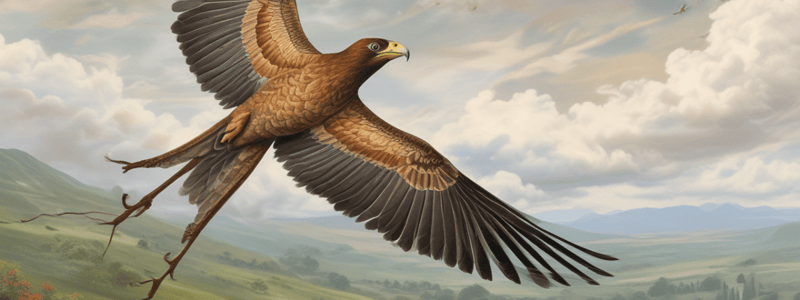Podcast
Questions and Answers
What literary device does Hopkins use to create a sense of the falcon's movement and appearance?
What literary device does Hopkins use to create a sense of the falcon's movement and appearance?
- Compound words (correct)
- Personification
- Metaphor
- Simile
What literary device is used in the sentence 'off, off' to create a sense of movement?
What literary device is used in the sentence 'off, off' to create a sense of movement?
- Enjambment
- Hyperbole
- Anadiplosis (correct)
- Caesura
What does the 'fire' in the line 'the fire that breaks from thee then' symbolise?
What does the 'fire' in the line 'the fire that breaks from thee then' symbolise?
- The beauty of the bird's flight
- The red plumage of the bird (correct)
- The sun shining down
- The poet's passion for nature
Flashcards
Hopkins' literary device for falcon movement
Hopkins' literary device for falcon movement
Compound words create a sense of the falcon's movement and appearance.
Literary device for 'off, off'
Literary device for 'off, off'
Anadiplosis emphasizes movement by repeating words.
'Fire' in 'the fire that breaks from thee then'
'Fire' in 'the fire that breaks from thee then'
The fire symbolizes the falcon's fiery red plumage.
Study Notes
The Windhover by Gerard Manley Hopkins
Themes
- The beauty of creation and the natural world
- Celebration of nature
- God's divine power
- Mankind's connection with nature
- Nature as a restorative force
Style
- Intensely detailed imagery
- Complex language
- Compound-words (e.g. "dapple-dawn-drawn")
- Euphonic sound effects (e.g. alliteration, sibilance)
- Caesura (e.g. exclamation marks)
- Enjambment (e.g. running on sentences without punctuation)
Imagery and Symbolism
- The windhover (falcon) represents beauty, power, and freedom
- The natural world is depicted as majestic and awe-inspiring
- Light and darkness are used to contrast beauty and ugliness
- The windhover's movement is described in vivid detail, emphasizing its connection to nature
Poetic Devices
- Anadiplosis (repetition of words or phrases, e.g. "off, off")
- Ellipsis (omission of words, e.g. "I caught...")
- Simile (e.g. "As a skate's heel sweeps smooth on a bow-bend")
- Hyperbole (exaggeration, e.g. "a billion times told lovelier")
- Internal rhyme (e.g. "gall themselves, and gash gold-vermillion")
Tone and Emotions
- The poem conveys a sense of wonder, awe, and ecstasy
- The speaker is deeply moved by the beauty of the windhover
- The poem expresses a sense of connection to nature and God's power
Studying That Suits You
Use AI to generate personalized quizzes and flashcards to suit your learning preferences.




